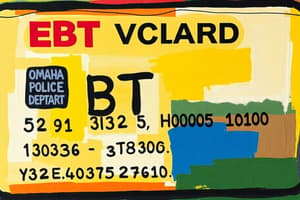Podcast
Questions and Answers
Which country currently recognizes the right to food in their constitution?
Which country currently recognizes the right to food in their constitution?
- India (correct)
- Germany
- France
- United States
What was the main reason for the increase in food insecurity rates after 2008?
What was the main reason for the increase in food insecurity rates after 2008?
- Government Policy Changes
- Improved SNAP benefits
- The Great Recession (correct)
- Natural Disasters
What is one of the main hurdles preventing many individuals from participating in SNAP?
What is one of the main hurdles preventing many individuals from participating in SNAP?
- Stigma associated with using government assistance (correct)
- Unclear application process
- Eligibility Criteria are too lenient
- Benefits are too low
What improvement to SNAP is proposed to better address food insecurity?
What improvement to SNAP is proposed to better address food insecurity?
Which regions in the United States are mentioned as facing higher food insecurity rates?
Which regions in the United States are mentioned as facing higher food insecurity rates?
What is one key feature of how SNAP operates during economic downturns?
What is one key feature of how SNAP operates during economic downturns?
What two broad sets of proposals are suggested for placing more requirements on SNAP recipients?
What two broad sets of proposals are suggested for placing more requirements on SNAP recipients?
Which of the following is a potential barrier to participation in SNAP?
Which of the following is a potential barrier to participation in SNAP?
How does the U.S. primarily assess food insecurity levels?
How does the U.S. primarily assess food insecurity levels?
Which statement is true regarding the right to food in the United States?
Which statement is true regarding the right to food in the United States?
What is a recommended improvement for SNAP to increase its effectiveness?
What is a recommended improvement for SNAP to increase its effectiveness?
Which of the following groups is not covered by SNAP?
Which of the following groups is not covered by SNAP?
What approach has been recommended to reduce stigma associated with SNAP?
What approach has been recommended to reduce stigma associated with SNAP?
What percentage of SNAP benefits are typically utilized within the first month of distribution?
What percentage of SNAP benefits are typically utilized within the first month of distribution?
Which of the following statements about the distribution of benefits is correct?
Which of the following statements about the distribution of benefits is correct?
What challenge does SNAP face in terms of its recipient population?
What challenge does SNAP face in terms of its recipient population?
What does SNAP stand for?
What does SNAP stand for?
Which group is NOT identified as potentially underserved by SNAP?
Which group is NOT identified as potentially underserved by SNAP?
Which state option allows participants to use SNAP benefits for restaurant meals?
Which state option allows participants to use SNAP benefits for restaurant meals?
Why is WIC participation low despite high eligibility?
Why is WIC participation low despite high eligibility?
What is the name of the plan used to determine the maximum benefit for SNAP?
What is the name of the plan used to determine the maximum benefit for SNAP?
What is a proposed solution to update the Thrift Food Plan?
What is a proposed solution to update the Thrift Food Plan?
What is a challenge associated with the Thrift Food Plan?
What is a challenge associated with the Thrift Food Plan?
Which of the following is NOT a goal of the National School Lunch Program?
Which of the following is NOT a goal of the National School Lunch Program?
Flashcards
Benefit Reduction with Increased Income
Benefit Reduction with Increased Income
SNAP benefits are designed to decrease as income increases, focusing aid on people with the lowest income.
SNAP Participation Barriers
SNAP Participation Barriers
Some eligible individuals choose not to participate in SNAP due to factors like stigma, the difficulty of applying, or eligibility restrictions.
SNAP Benefit Distribution
SNAP Benefit Distribution
SNAP benefits are delivered through electronic cards, which can be used at numerous retail locations.
SNAP as an Entitlement
SNAP as an Entitlement
Signup and view all the flashcards
SNAP and Autonomy
SNAP and Autonomy
Signup and view all the flashcards
SNAP Benefit Adequacy
SNAP Benefit Adequacy
Signup and view all the flashcards
SNAP and Food Insecurity
SNAP and Food Insecurity
Signup and view all the flashcards
SNAP Limitations
SNAP Limitations
Signup and view all the flashcards
How does SNAP determine maximum benefits?
How does SNAP determine maximum benefits?
Signup and view all the flashcards
Primary shortcoming of SNAP's benefit calculation?
Primary shortcoming of SNAP's benefit calculation?
Signup and view all the flashcards
Additional reason for inadequate SNAP benefits?
Additional reason for inadequate SNAP benefits?
Signup and view all the flashcards
Proposed solution #1 for SNAP adequacy
Proposed solution #1 for SNAP adequacy
Signup and view all the flashcards
Proposed solution #2 for SNAP adequacy
Proposed solution #2 for SNAP adequacy
Signup and view all the flashcards
Right to Food in the U.S. Constitution?
Right to Food in the U.S. Constitution?
Signup and view all the flashcards
What is the Restaurant Meals Program (RMP)?
What is the Restaurant Meals Program (RMP)?
Signup and view all the flashcards
Food Insecurity Trend (2000-2017)
Food Insecurity Trend (2000-2017)
Signup and view all the flashcards
Food Insecurity: Regional Differences
Food Insecurity: Regional Differences
Signup and view all the flashcards
What is WIC?
What is WIC?
Signup and view all the flashcards
SNAP Participation Hurdles
SNAP Participation Hurdles
Signup and view all the flashcards
What are the goals of NSLP and SBP?
What are the goals of NSLP and SBP?
Signup and view all the flashcards
Proposed SNAP Requirements
Proposed SNAP Requirements
Signup and view all the flashcards
Proposed SNAP Improvement
Proposed SNAP Improvement
Signup and view all the flashcards
Food Security and International Agreements
Food Security and International Agreements
Signup and view all the flashcards
Measuring Food Security in the U.S.
Measuring Food Security in the U.S.
Signup and view all the flashcards
Study Notes
Right to Food
- The US does not have a right to food in its constitution, nor do any members of the European Union.
- 29 other countries recognize the right to food.
- Food insecurity in the US remained stable until 2008, then increased due to the recession.
- Food insecurity varies regionally, with areas like the Mississippi Delta and Appalachia experiencing higher rates due to income inequality.
SNAP Participation Hurdles
- Two main barriers to SNAP participation are stigma associated with government assistance programs and the perceived burden of the application process.
- These application costs may outweigh the program benefits for some individuals.
SNAP Recipient Requirements
- Proposals to place more requirements on SNAP recipients include imposing work requirements.
- Guidelines for what recipients can and cannot purchase with SNAP benefits.
Improving SNAP Access
- Increasing the gross income limit to 200% of the poverty line could allow more households access to SNAP benefits.
Food Insecurity and International Agreements
- Food insecurity is connected to the "right to food," formalized in agreements like the International Covenant on Economic, Social, and Cultural Rights.
- The US does not have a "right to food" but has the Supplemental Nutrition Assistance Program (SNAP) that exists for over 50 years.
- Food security is measured using the Core Food Security Module (CFSM).
- Households are categorized as food secure, low food secure, or very low food secure based on financial constraints and related questions.
Food Insecurity Trends
- Food insecurity increased significantly during the 2008-2014 Great Recession, but rates since have declined, albeit still above pre-recession levels.
Geographic Disparities in Food Insecurity
- Rural areas like Appalachia and the Mississippi Delta experience higher rates of food insecurity.
- SNAP eligibility is based on income, assets, and household needs, with benefits decreasing as income rises.
Effective Mechanisms (SNAP)
- Benefits are delivered electronically via EBT cards, compatible with over 250,000 retail outlets.
SNAP as an Entitlement Program
- SNAP remains fully funded. It expands during economic downturns, as it's an entitlement program, without requiring special government funding.
Minimal Conditions for SNAP Recipients
- Minimal conditions are currently imposed on recipients, but proposed work requirements or restrictions on food purchases may increase stigma and dissuade participation.
Providing Sufficient Resources (SNAP)
- Current SNAP benefits often fail to meet recipients' needs, and some face food insecurity.
Challenges Regarding SNAP
- Should SNAP's goal be ending all food insecurity or meeting only specific cases?
- Governments should avoid policies that increase access barriers (e.g., food taxes).
- SNAP does not cover everyone in need, including undocumented immigrants and people with disabilities.
Adapting SNAP in Other Countries
- Implementing SNAP in other countries might require adapting to different infrastructure levels.
Coordination with Other Programs (e.g. SNAP)
- Coordinated programs like school lunches support food security for vulnerable populations like students.
Modernizing SNAP Benefits
- SNAP benefits use the "Thrift Food Plan" (TFP).
- Calculation: Maximum benefit - 30% of net income.
- The TFP is outdated and unrealistic because it assumes sufficient time to prepare food.
- Teenagers may not adequately be categorized, leading to insufficiency of benefits.
- Three proposals suggest increasing the TFP by 20% to account for time costs, updating the TFP to reflect geographic price differences and diverse household needs.
- Benefit of this modernization proposal: Reduce food insecurity.
- Cost: Increased annual budget for SNAP.
Additional Programs
- WIC (Women, Infants, and Children)
- Child Nutrition Programs (NSLP/SBP/CEP)
- Benefits are primarily used shortly after receiving them.
- In-kind assistance provides specific goods and services over cash.
- Childhood access to SNAP is linked to health and reduced risk of metabolic syndrome.
- Elderly, disabled, and unhoused people are common groups requiring assistance through SNAP.
Restaurant Meals Program (RMP)
- A state-level SNAP option, RMP directs benefits toward prepared meals at restaurants.
- As of the writing, only 9 states participate in this program.
School Meal Programs
- National School Lunch Program (NSLP): Provides free, reduced, and full-price lunches for students.
- School Breakfast Program (SBP): Provides meals to children with similar income-based eligibility to NSLP.
Studying That Suits You
Use AI to generate personalized quizzes and flashcards to suit your learning preferences.





